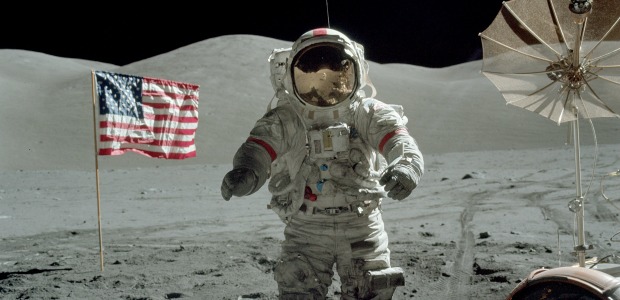The Last Man On The Moon
The ultimate story of man’s unprecedented duel with nature
Plot summary
When Apollo astronaut Gene Cernan stepped off the moon in December 1972 he left his footprints and his daughter’s initials in the lunar dust. Only now, over forty years later, is he ready to share his story.

Former NASA astronaut and Navy Captain Gene Cernan became the last man to walk on the moon in December 1972. Featuring rare footage of the last moonwalk, and interviews with former astronauts, including Apollo 13 commander Jim Lovell, the documentary shares Cernan’s personal story of fulfilment, love and loss.
The Last Man on the Moon charts Eugene “Gene” Cernan’s incredible career from a Top Gun Naval pilot, to an early NASA astronaut and the last of the 12 men to ever set foot on the moon. Director Mark Craig (Talk To Me, The Flying Scot) takes us on an intimate journey, encapsulating the pioneering-spirit and at times brutality of early space travel.
Cernan’s openness and honesty about his experiences and what drove him to be part of the space programme is the backdrop to the film. The 81-year-old, a considered and articulate narrator, speaks with the spirit of a young boy, still enchanted by space and its endless possibilities. It is the ultimate story of man’s unprecedented duel with nature, told through the eyes of one man’s experiences.
The retelling of his troubled spacewalk, the second ever by a NASA astronaut, induces the same feeling of panic experienced watching Gravity (it feels like the inspiration for that film’s opening scene). When he speaks about stepping back onto Apollo 17 after spending three days on the surface of the moon, you are with him as he takes one last look back at earth before returning to the lunar module for the final time.
Cernan is a believable and trusted narrator with an unbelievable story to tell. Whilst we hear about the innocent wonder and glory of early space travel, the film highlights the tragedies that befell early Apollo missions. The astronauts, ground control and families all suffer with each life lost. Footage, such as early fighter jets landing, sometimes crashing, onto aircraft carriers, the panicked voices of space control during that second moonwalk and images of a burnt out jet carrying two Apollo astronauts brings home the very real risks.
Cernan’s life, which is entwined with the pioneering, boundary-pushing endeavours of the early space programme, is inspiring, sad and moving. As a young boy exhilarated by Apollo 13, The Last Man on the Moon reignites that early fascination with space travel. Instead of relying on actors and computer generated scenes, you hear the real voices and images of the people and spacecraft involved in that piece of history.
The Last Man on the Moon is in cinemas from 8 April with a special nationwide live Q&A with Captain Eugene Cernan on 11 April only.











COMMENTS